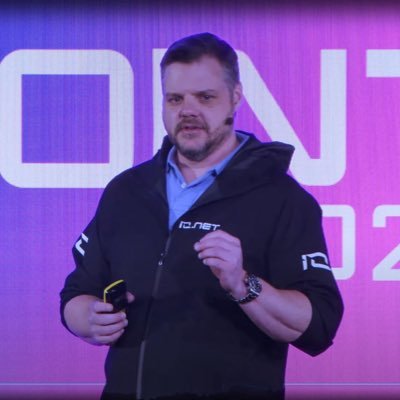Questo è un enorme caso rialzista per le criptovalute che molti ancora trascurano.
Raggruppare risorse di calcolo inattive in modo geo-distribuito su scala globale, sfruttando il coordinamento onchain e stabilendo un mercato senza permessi per il calcolo di livello istituzionale è un abilitante cruciale per i costruttori di AI in tutti i settori.
Servire un mercato emergente dell'AI da trilioni di dollari con il calcolo (a prezzi molto competitivi) di cui ha disperatamente bisogno in mezzo a una carenza globale di GPU sempre più intensa.
Davvero uno dei PMF più convincenti per la tecnologia crypto là fuori, e una grande opportunità in termini monetari per i giocatori che riescono a catturare una quota di mercato significativa.
Studia DeAI.
Collegandomi anche a un altro recente post su DeAI che ho fatto qui (che copre anche alcuni altri livelli dello stack):
DeAI could be the biggest use case + market opportunity our industry has seen to date. We're talking trillions here. Why?
Decentralized infrastructure matters across so many layers of the AI stack:
- Economic incentive systems for contribution to open-source AI development, e.g. optimizing models on open innovation networks like Bittensor or @tigfoundation or providing (attributable) data to training/fine-tuning data sets on @OpenledgerHQ.
- Verifiable inference to create real accountability, fight hallucinations, and enable agentic systems with fully auditable onchain traceability with solutions ranging from purpose-built networks like @Mira_Network to @OpacityNetwork's zkTLS or @wardenprotocol's tooling to build apps leveraging verifiable AI models, among others.
- Decentralized training infrastructure that enables large-scale open-source models to be trained collectively, which is pretty much what Bittensor and @tigfoundation are built for, just like @AlloraNetwork (narrowly focused on predictive intelligence), or specialized subnets on Bittensor like @tplr_ai which has already given rise to Templar I.
- MPC-based private compute networks that enable confidential model training & inference like @nillionnetwork, @ArciumHQ or @LitProtocol are crucial enablers for any AI-driven use cases that involves sensitive/personal data from sectors like healthcare to insurance and finance, or even (various forms of) personalized AI companions.
- Decentralized GPU networks like @ionet that allow for geo-distributed clustering of otherwise idle GPUs globally, democratize access to compute, and improve efficiency in resource allocation, not only providing a cost-effective alternative to centralized providers, but actively addressing the global GPU shortage, and the fact that GPU production is not able to keep up with the rapidly growing demand.
- User-owned open-source AI models matter, and ownership + governance across the stack, but especially on the model level should be a core public interest, given the importance and increasing dominance AI displays in our lives. In the centralized AI paradigm, you are the product, while corporate giants that build closed-source models and hoard your data behind their corporate walls, grow increasingly powerful. Meanwhile, all users and integrators are subject to changes the controlling entity chooses to implement on the model. To avoid manipulation, ensure safety, and maximize performance, having powerful, open, and democratically governed models on the one hand, and small, specialized models derived from open source base models for various use cases on the other, will be increasingly important. Both becomes possible with crypto. Certainly a very broad point, but still worth highlighting @NEARProtocol here for its efforts on the user-owned AI front (especially with @near_ai but also given the efforts to build the largest open-source LLM in the market), or @OpenledgerHQ for enabling (no-code) fine-tuning of open-source AI models on attributable and verifiable datasets.
- Public blockchains provide the deterministic, programmable, financial infrastructure for AI agents to engage in economic activity, and thrive on. While in the "real world" agents can't sign up for a credit card and might have to wait days for a bank transfer (given they can get access to an account), DeFi offers a vast ecosystem of financial primitives that agents can leverage when provided a wallet to work with. Given its positioning as an AI-native blockchain, its once again worth highlighting @NEARProtocol, which given its natively chain-abstracted accounts, NEAR intents, it's low cost/high performance, and a lot of surrounding infra/tooling for AI builders, is in a great spot to capture a lot of agentic activity.
- VLAs (vision-language-action models) lack a Langchain-style framework that empowers autonomous operators to execute complex tasks ranging from desktop based workflow automation to AI-driven gaming companions or even enabling robotics systems to operate seamlessly within complex environments (think within a factory) in a fully traceable, and verifiable manner. Yet, that is exactly what @codecopenflow is building, with a built-in, tokenized marketplace for operators, no-code VLA training, and smart compute aggregation from decentralized networks, empowering builders with seamless tooling and compute access. Meanwhile, each workflow step by operators (that can also run on private and/or proprietary infra) can optionally be recorded on Solana, ensuring full verifiability with an auditable onchain trace. Absolutely huge imo and a crucial enabler across various sectors that are leveraging VLAs (which will soon rise to the same level of prominence LLMs have reached already).
Surely there is more, but I think the above pretty impressively showcases already why & how DeAI matters in a market that will be worth trillions as growth in the broader AI industry continues to accelerate rapidly.
DYOR anon.
6.723
13
Il contenuto di questa pagina è fornito da terze parti. Salvo diversa indicazione, OKX non è l'autore degli articoli citati e non rivendica alcun copyright sui materiali. Il contenuto è fornito solo a scopo informativo e non rappresenta le opinioni di OKX. Non intende essere un'approvazione di alcun tipo e non deve essere considerato un consiglio di investimento o una sollecitazione all'acquisto o alla vendita di asset digitali. Nella misura in cui l'IA generativa viene utilizzata per fornire riepiloghi o altre informazioni, tale contenuto generato dall'IA potrebbe essere impreciso o incoerente. Leggi l'articolo collegato per ulteriori dettagli e informazioni. OKX non è responsabile per i contenuti ospitati su siti di terze parti. Gli holding di asset digitali, tra cui stablecoin e NFT, comportano un elevato grado di rischio e possono fluttuare notevolmente. Dovresti valutare attentamente se effettuare il trading o detenere asset digitali è adatto a te alla luce della tua situazione finanziaria.


